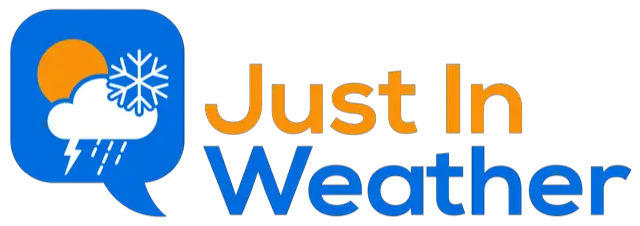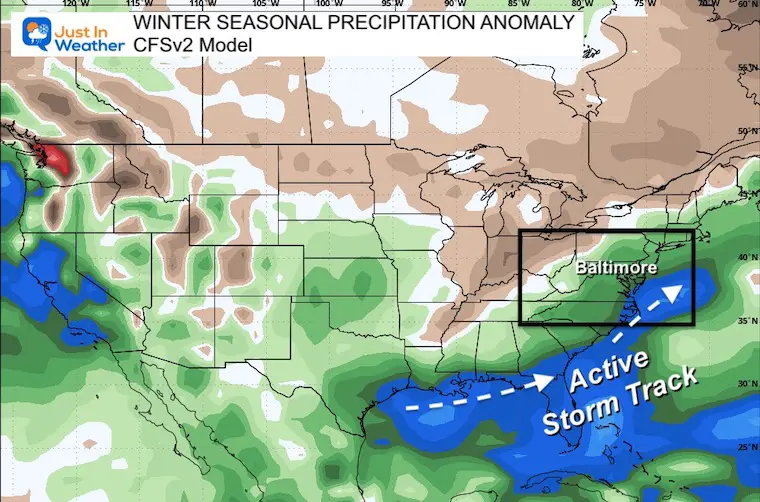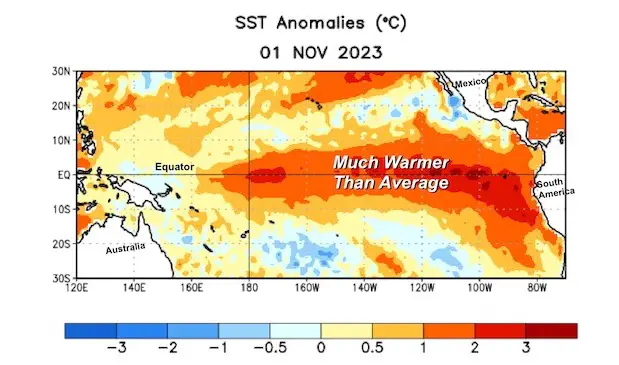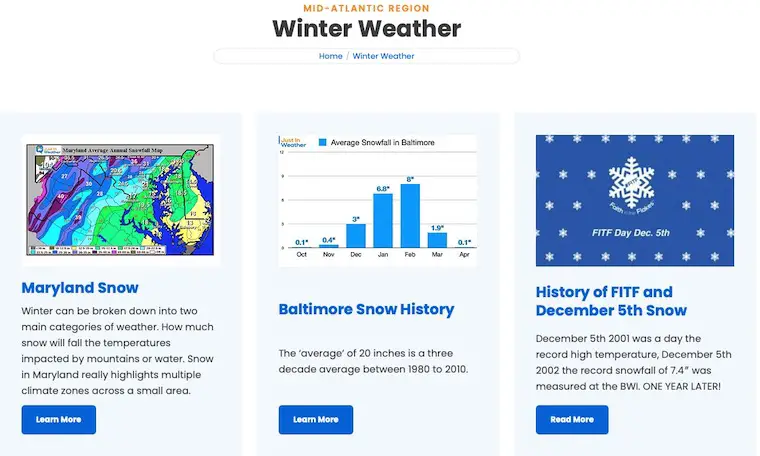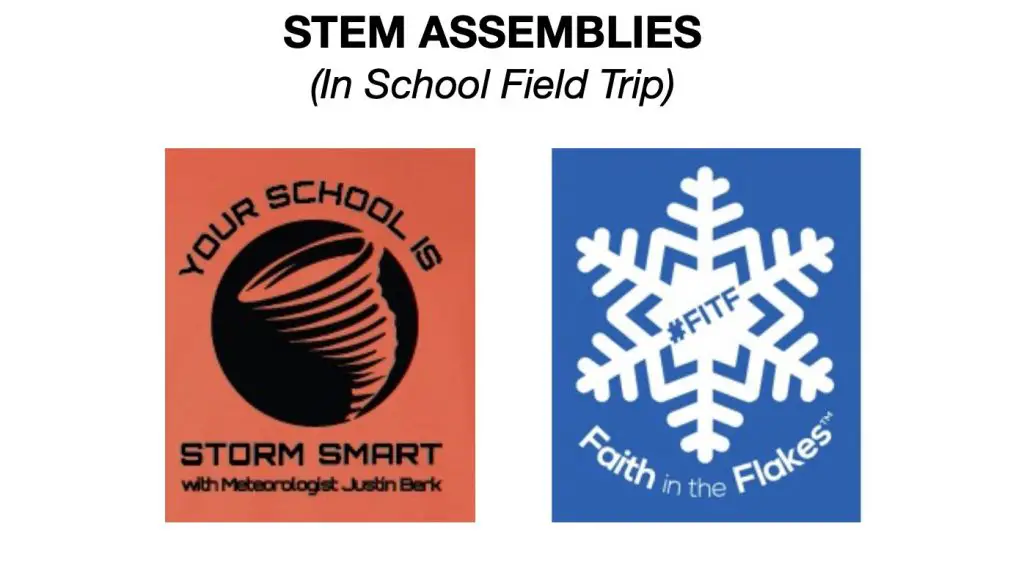El Niño Update Late November: Shifting West May Mean More Snow For Eastern US
November 27, 2023
The weekly update for El Niño has taken a few days to process. As we track and compare, a few things stand out for monitoring the warming water in the tropical Pacific Ocean. The latest measurements show the warmest water of the event AND a shift to the west.
The importance here is two fold:
- The water temperature is on the top end of the forecast and is expected to grow stronger in December and January.
- When the warm water moves west into Region 3.4, it often all the downstream storm track to favor snow for the Eastern US.
El Niño Regions
This is the Pacific Ocean along the Equator. The regions are designated as shown. For a moderate to strong El Niño, the prime region to watch is 3.4.
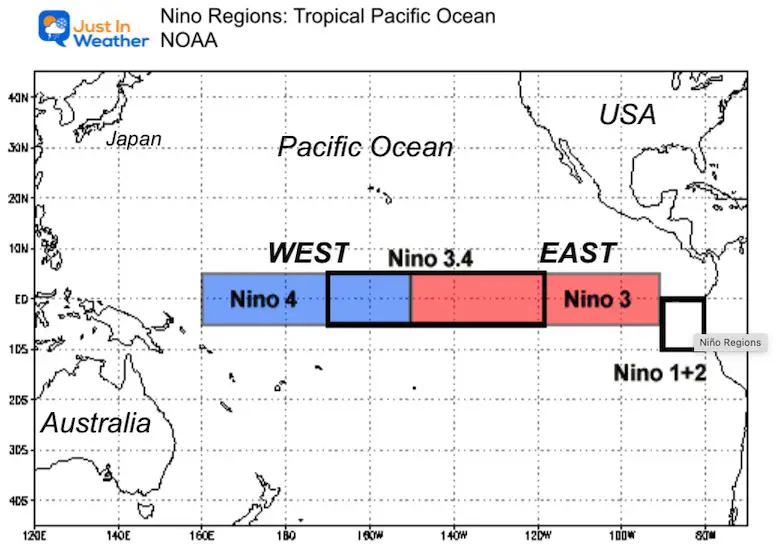
Latest Sea Surface Temperature Anomaly: November 22
This is the comparison to average water temperature.
2.18ºC ABOVE AVERAGE is the highest of the event (so far).
Here we also see distinct warming expanding farther WEST into Region 3.4 and Region 4.
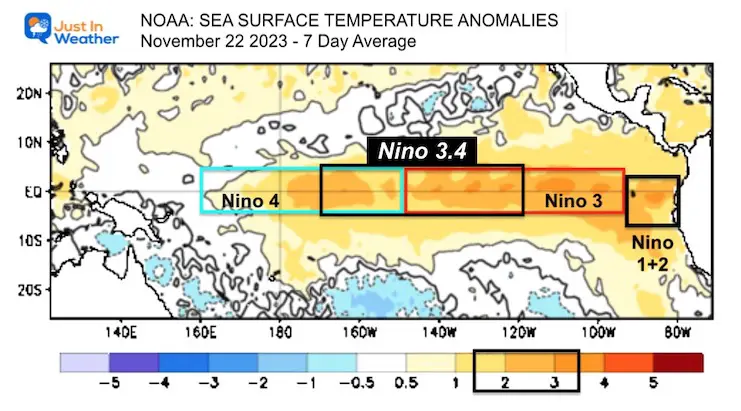
Region Temperature Measurement Comparison
Region 1 + 2 (EAST)
Notice the downward trend. That signals cooling as the warm water gets pushed farther WEST.
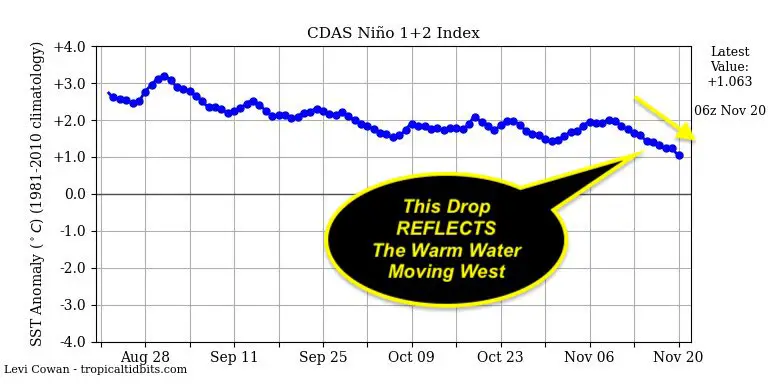
Region 3.4
This recent BUMP shows the warming in this area that is the significant factor to grade this El Niño.
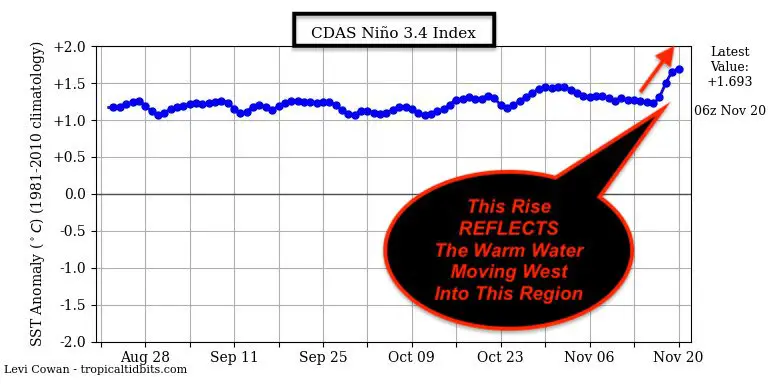
Sea Surface Temperature Trend Per Region
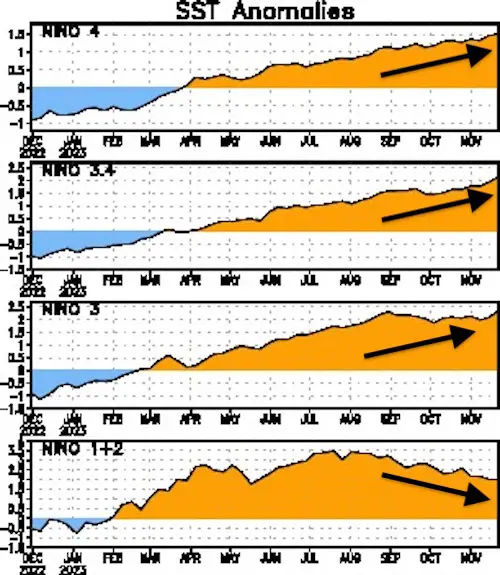
Animation September 6 to November 22
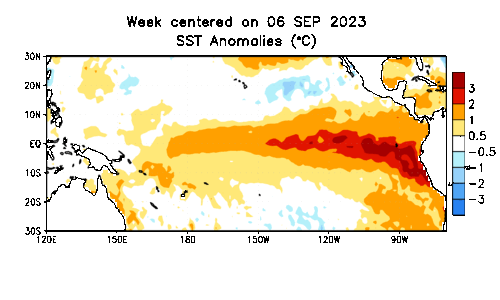
What Does This Mean?
Well, the warmer water of El Niño located in the Central Pacific Ocean is the birthing ground for many storms that can influence the Southern Jet Stream. This, in turn, dictates a lot of storms we can get in the US… with a higher trend for the Gulf of Mexico and the East Coast of the US. Get your chimney sweep ASAP
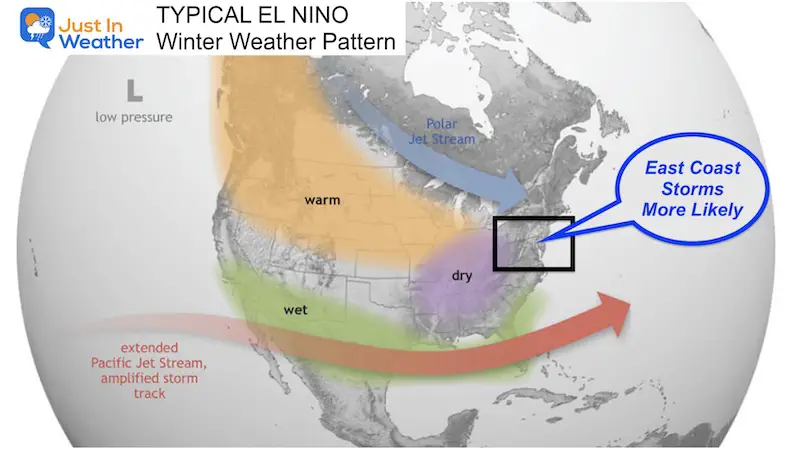
My Suggested Winter Storm Tracks
- Inland Tracks = More Rain (some ice)
- Coastal Storms DO NOT guarantee snow for us. It is threading the needle to get it just right for big snow.
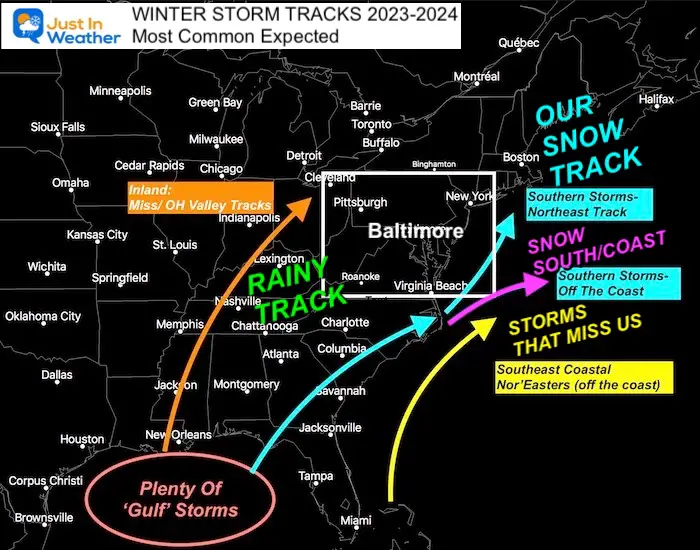
Mid Atlantic Influence
From my Winter Outlook report: The recent Moderate to Strong El Niños have either brought Baltimore, MD, very low snow under 5 inches or very high over 35 inches. The typical winter brings close to 20 inches.
The higher snow winters occurred when El Niño was focused in Region 3.4 or Region 4.
Since 2000, the moderate to strong El Niños have brought two of the top three snowy winters.
Since 1972: 5 of 8 of these winters have had at least 35 inches of snow.
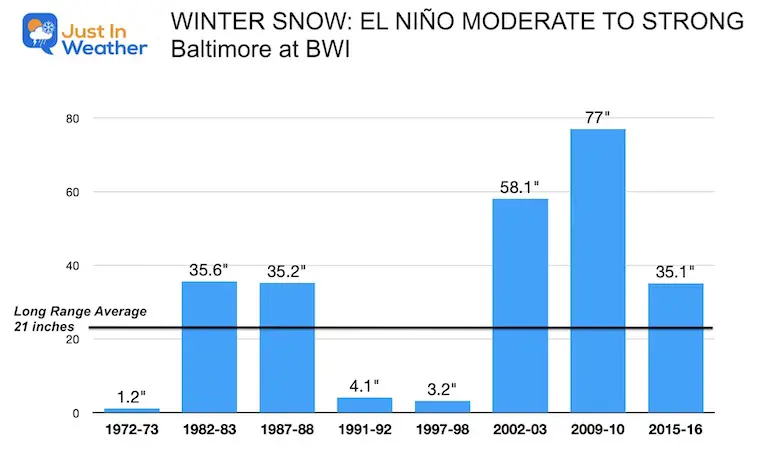
My Forecast Outlook: Seasonal Snow Potential
I went 20 to 30 for Baltimore to play on the tendency for the observation at the airport to be lower due to more artificial heating.
My map does account for up to 50% above average. We only need one or two solid storms to bust on the high end.
My Call For Snowfall
- Above average all around. (Click here for my full report)
- I gave large ranges to account for variations within storms.
- Big BUST Potential. There will either be a very favorable pattern with multiple moderate to large storms… or we will end up missing the action.
- Storms will be MORE FAVORABLE JANUARY AND FEBRUARY.
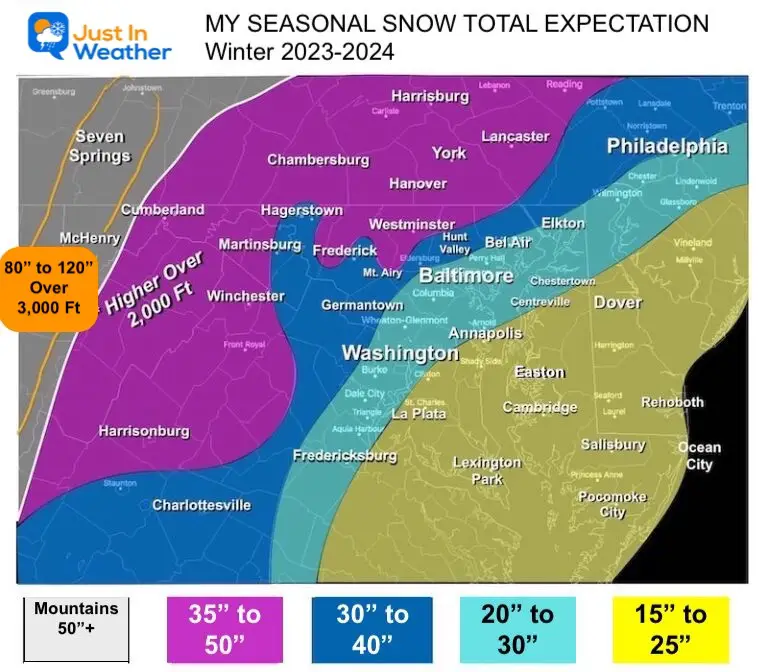
Other Winter Outlook Reports:
El Niño Winter Updates
Computer Models Support East Coast Storm Track
The latest NOAA report is confident in a Very Strong event. Possibly HISTORIC! This refers to the temperatures in the Pacific, with impacts on the US Winter Storm Track.
Winter Weather Folklore: Top 20 and more signals from nature for snow.
Winter Outlook 2024 From Two Farmers Almanacs Return to Cold and Snow
Subscribe for eMail Alerts
Weather posts straight to your inbox
Sign up and be the first to know!
Explore More
Maryland Snow Climate History And Other Winter Pages
Faith in the Flakes Gear
STEM Assemblies/In School Fields Trips Are Back
Click to see more and ‘Book’ a visit to your school
Please share your thoughts and best weather pics/videos, or just keep in touch via social media
-
Facebook: Justin Berk, Meteorologist
-
Twitter
-
Instagram
RESTATING MY MESSAGE ABOUT DYSLEXIA
I am aware there are some spelling and grammar typos and occasional other glitches. I take responsibility for my mistakes and even the computer glitches I may miss. I have made a few public statements over the years, but if you are new here, you may have missed it: I have dyslexia and found out during my second year at Cornell University. It didn’t stop me from getting my meteorology degree and being the first to get the AMS CBM in the Baltimore/Washington region. One of my professors told me that I had made it that far without knowing and to not let it be a crutch going forward. That was Mark Wysocki, and he was absolutely correct! I do miss my mistakes in my own proofreading. The autocorrect spell check on my computer sometimes does an injustice to make it worse. I also can make mistakes in forecasting. No one is perfect at predicting the future. All of the maps and information are accurate. The ‘wordy’ stuff can get sticky. There has been no editor who can check my work when I need it and have it ready to send out in a newsworthy timeline. Barbara Werner is a member of the web team that helps me maintain this site. She has taken it upon herself to edit typos when she is available. That could be AFTER you read this. I accept this and perhaps proves what you read is really from me… It’s part of my charm.
#FITF




